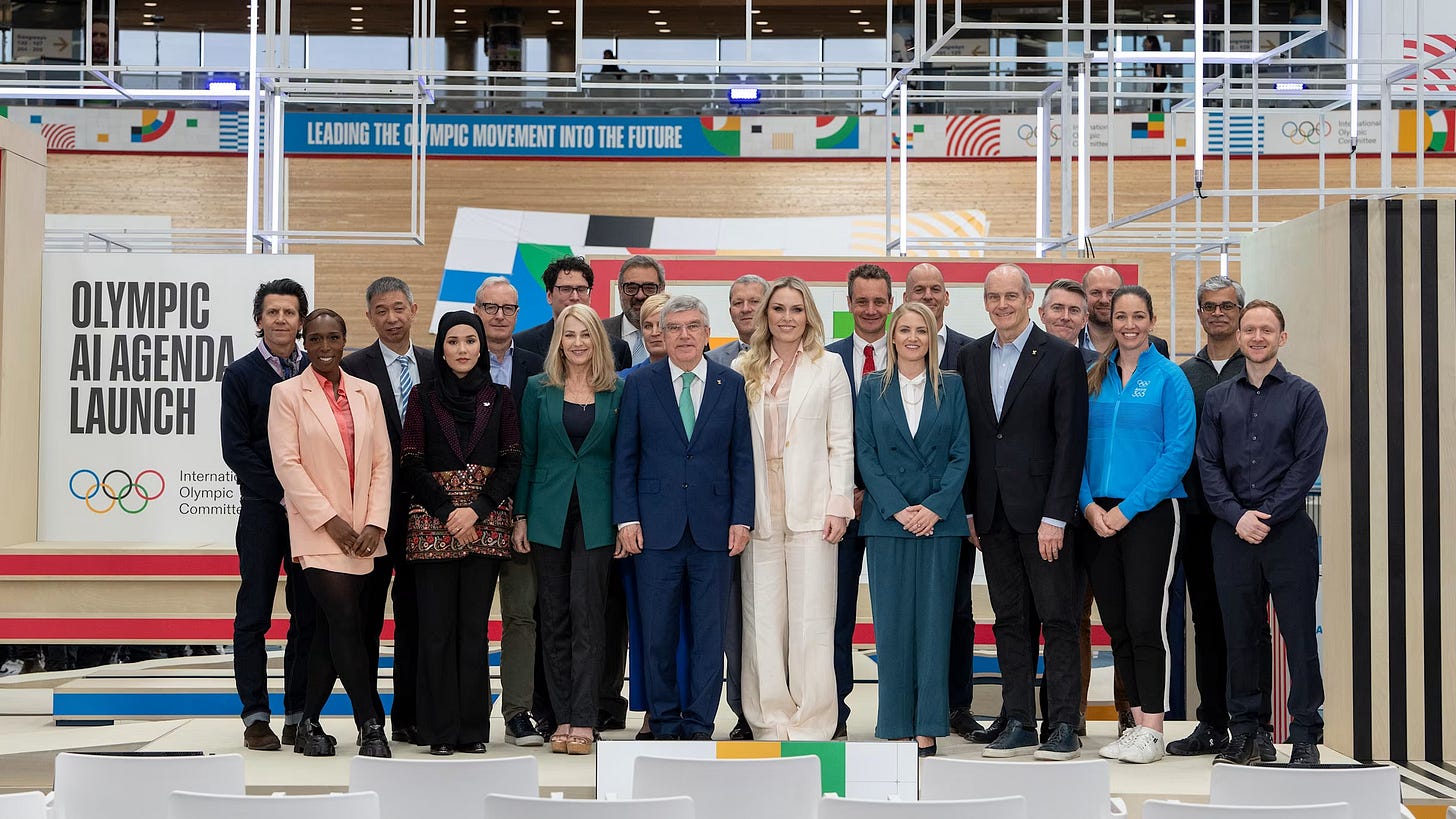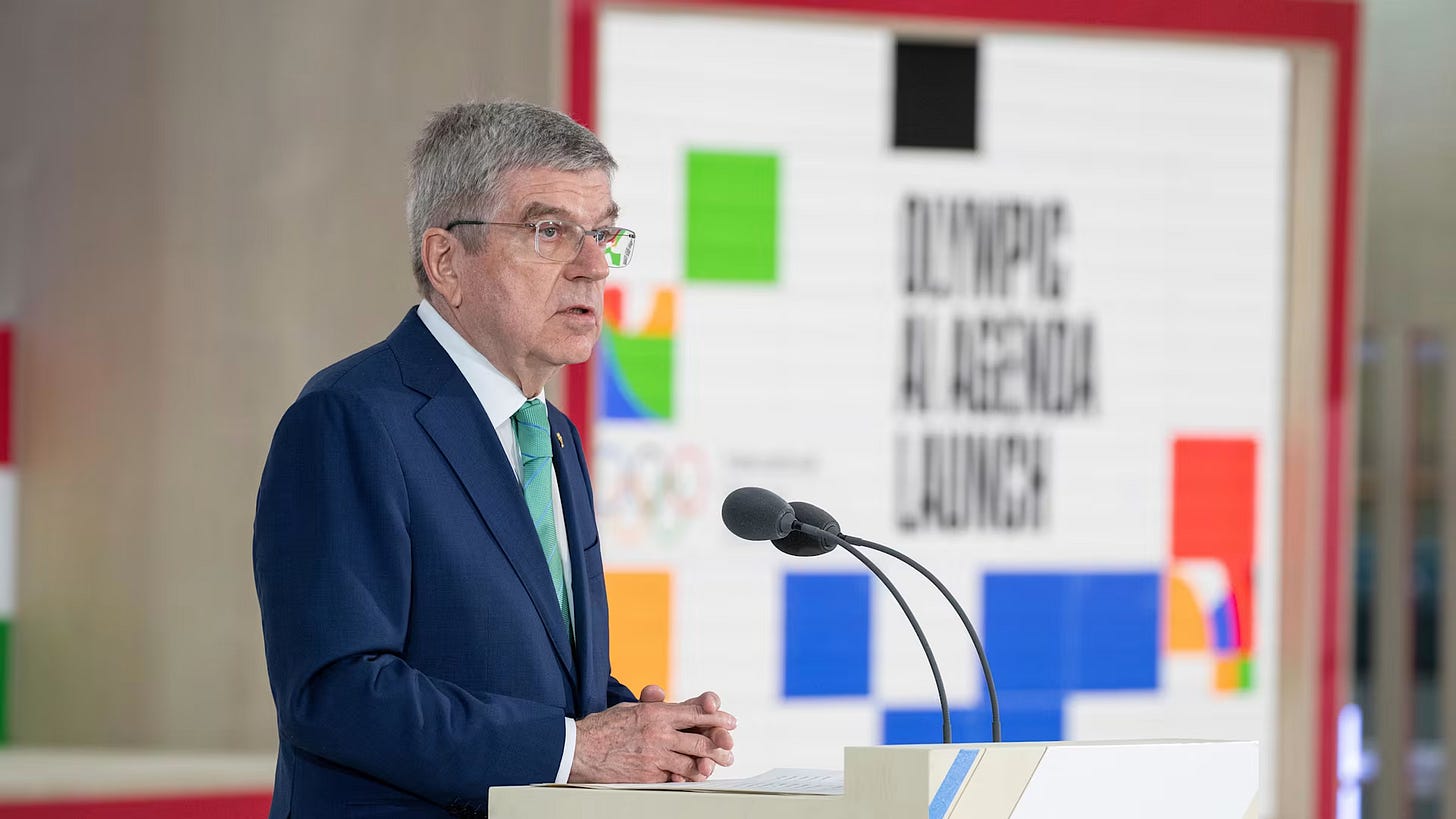AI-Powered Olympics: The Tech Revolution at Paris 2024
How Artificial Intelligence is Transforming the Olympic Experience for Athletes, Officials, and Fans
Image source: Olympics
The First Whistle
The Olympic Games have long been a showcase for cutting-edge technology, pushing the boundaries of what's possible in sports. From the introduction of electronic timing at the 1912 Stockholm Olympics to the debut of instant replay in Munich 1972, technology has continuously enhanced the Olympic experience.
Recent Games have seen even more dramatic leaps:
Beijing 2008 introduced high-definition broadcasting, bringing the Olympics into the living rooms of millions with unprecedented clarity.
London 2012 saw the widespread use of social media integration, connecting athletes directly with fans worldwide.
Rio 2016 embraced virtual reality, offering immersive experiences for viewers at home.
Tokyo 2020 (held in 2021) utilised advanced robotics for assistance and 3D athlete tracking for enhanced performance analysis.
Now, as we approach the Paris 2024 Olympics, we stand on the brink of perhaps the most significant technological revolution in Olympic history: the integration of Artificial Intelligence (AI) across all aspects of the Games.
The International Olympic Committee (IOC) has unveiled its groundbreaking AI Agenda, a comprehensive strategy to harness the power of AI in ways that promise to transform the Olympic experience for athletes, officials, and spectators alike. This initiative represents a bold step into the future, aiming to enhance performance, ensure fairness, and create more engaging experiences for fans around the globe.
In this newsletter, we'll explore how the IOC's AI Agenda is set to redefine the Olympic landscape, examining its potential impacts and the exciting innovations we can expect to see at Paris 2024. From AI-powered training regimens to advanced officiating tools, and from personalised viewer experiences to behind-the-scenes logistics, we'll uncover how artificial intelligence is ushering in a new era for the world's premier sporting event.
Join us as we dive into the fascinating intersection of sports and technology, and discover how the Paris 2024 Olympics are poised to become the most technologically advanced Games to date.
2. The Olympic AI Agenda: A Game-Changer
The International Olympic Committee's AI Agenda represents a watershed moment in the history of sports technology. As the third in a trilogy of strategic documents launched under Thomas Bach's leadership, this initiative sets out to define the IOC's vision for AI in sports and establish guiding principles for its implementation.
At its core, the AI Agenda aims to explore the full potential of artificial intelligence in the Olympic movement while ensuring responsible and ethical use. IOC President Thomas Bach emphasises this commitment, stating, "We are determined to use AI in a responsible way," adding that the framework is designed to "enable equal access for all."
The agenda outlines several key objectives:
Identifying high-impact areas for AI application in sports
Exploring frameworks and governance to mitigate risks
Promoting responsible AI use across the Olympic movement
Ensuring equal access and opportunities for all participants
Bach underscores the comprehensive nature of this initiative, explaining, "It defines our vision, ambition and guiding principles to understand the full potential of AI." This holistic approach demonstrates the IOC's commitment to leveraging AI not just as a technological tool, but as a means to enhance the overall Olympic experience.
The AI Agenda was developed with input from a diverse panel of global experts, including AI pioneers, academics, athletes, and technology companies. This collaborative approach ensures that the strategy addresses the needs and concerns of all stakeholders in the Olympic movement.
As we look ahead to the Paris 2024 Olympics and beyond, the AI Agenda promises to shape a future where technology enhances rather than replaces the human element of sports. In the following sections, we'll explore how this vision is being brought to life, starting with the ways AI is set to revolutionise athlete performance and training. Let's dive into the exciting world of AI-powered athleticism and discover how it's changing the game for Olympic competitors.
3. AI for Athletes: Enhancing Performance and Safety
Artificial Intelligence is set to revolutionise how athletes prepare for and compete in the Olympic Games in Paris, and beyond. Here are key areas where AI is making a significant impact:
Personalised Training:
AI algorithms analyse individual athlete data to create tailored training programs
Real-time adjustments based on performance metrics and recovery rates
Talent Identification and Scouting:
Machine learning models identify potential Olympic talents globally
Analysis of physical attributes, performance data, and progression patterns
Injury Prevention:
AI-powered wearables monitor athlete health in real-time
Predictive models flag potential injury risks before they become serious
Performance Analysis:
Advanced video analysis provides detailed insights on technique and strategy
AI-generated reports offer actionable feedback for improvement
Mental Health Support:
IOC introduces an AI-based SNS monitoring system to prevent online abuse
This proactive approach aims to create a safer online environment for athletes, reducing mental stress and potential distractions during competition
Virtual Reality Training:
AI-powered VR simulations for strategy practice and mental preparation
Replication of competition environments for acclimatisation
These AI-driven innovations, although not extensive, are not just enhancing athlete performance but also prioritising their well-being. As we've seen how AI is transforming the athlete experience, let's now turn our attention to how it's revolutionising another crucial aspect of the Olympics: officiating and judging. The next section will explore how AI is ensuring fairness and accuracy in Olympic competitions.
IOC President Thomas Bach (Olympics)
4. Revolutionising Officiating and Judging
The 2024 Paris Olympics are set to showcase how AI can enhance the accuracy and fairness of officiating and judging across various sports. Here's how AI is making a difference:
1. Enhanced Scoring Systems:
- AI-powered computer vision technology provides additional information for more accurate scoring
- Particularly beneficial in subjective sports like gymnastics and diving
2. Real-Time Analysis:
- AI algorithms analyse gameplay in real-time, offering instant insights to officials
- Helps in quick decision-making during fast-paced events
3. 3D Replay and Tracking:
- Omega's AI-based computer vision technology reproduces game processes in 3D
- Tracks athletes in real-time using optical sensors, aiding in close calls and reviews
4. Sport-Specific Applications:
- Gymnastics: AI assists in analysing complex movements and rotations
- Pole Vaulting: Precise measurement of heights and technique analysis
- Tennis: Line calls and ball tracking (building on previous Hawk-Eye technology)
- Beach Volleyball: Player positioning and ball trajectory analysis
5. Consistency in Judging:
- AI helps maintain consistent judging standards across multiple events and days
- Reduces the impact of human fatigue or bias in long competitions
6. Training for Officials:
- AI-powered simulations help train and prepare officials for various scenarios
- Enhances overall officiating quality across all Olympic events
By integrating these AI technologies, the Paris Olympics aim to set a new standard for fairness and accuracy in sports officiating. This not only benefits the athletes but also enhances the viewer experience by providing more transparent judging processes.
As we've explored how AI is transforming officiating, let's now turn our attention to how it's revolutionising the way fans around the world experience the Olympics. The next section will delve into the exciting world of AI-enhanced viewer experiences.
5. Transforming the Viewer Experience
The Paris 2024 Olympics are set to revolutionise how fans engage with the Games, thanks to some cutting-edge AI technologies that will be on display:
Personalised Highlights:
NBC's "Peacock" service will use AI to create up to 7 million personalised highlight videos for US viewers
AI-powered editing of live broadcasts to cater to individual preferences
AI Caster Technology:
NBC introduces an AI caster that narrates highlights using the voice of legendary commentator Al Michaels
Voice synthesis technology recreates Michaels' prime-era voice for an authentic feel
Interactive Viewing Experiences:
AI-driven platforms offer customisable viewing options
Real-time stats, athlete information, and performance analysis at viewers' fingertips
Multi-language Support:
AI-powered real-time translation for commentary and interviews
Enhances accessibility for a global audience
Virtual Reality Integration:
AI-enhanced VR experiences place viewers in the heart of the action
Virtual tours of Olympic venues and behind-the-scenes access
Enhanced Safety Measures:
AI-powered mass surveillance systems deployed across Paris for real-time security
Collaboration with companies like Videtics, Orange Business, ChapsVision, and Wintics
Immediate detection and alerts for potential security issues, such as crowd surges or suspicious objects
These AI-driven innovations aim to create a more immersive, personalised, and secure Olympic experience for viewers and attendees alike. However, as we embrace these technological advancements, it's crucial to consider how they interact with the traditions and human elements that make the Olympics what they are.
6. The Human Element: Balancing AI and Tradition
While artificial intelligence is revolutionising the Olympic experience, the IOC remains committed to preserving the essence of human achievement that lies at the heart of the Games. This delicate balance between innovation and tradition is a key focus of the Olympic AI Agenda.
Athletes at the Center:
IOC President Thomas Bach emphasises: "At the center of the Olympic AI Agenda are human beings. This means: the athletes. Because the athletes are the heart of the Olympic Movement."
AI is designed to support, not replace, human performance
Preserving Athletic Integrity:
The 100 meters will always be run by a human athlete, not a machine
AI enhances training and judging but doesn't compete or make final decisions
Ethical Considerations:
Strict guidelines ensure AI use doesn't compromise fair play or athlete privacy
Transparency in AI applications to maintain trust in the competition
Human Connection:
AI-enhanced broadcasts aim to deepen, not replace, the emotional connection between athletes and viewers
Personal stories and human interest elements remain central to Olympic coverage
By carefully navigating this balance, the IOC aims to harness the power of AI while ensuring that the Olympic Games continue to celebrate the peak of human athletic achievement and cultural exchange. This approach sets the stage for an Olympics that embraces the future while honouring its rich past.
As we look ahead, it's clear that the integration of AI in the Olympic Games is just beginning. Let's explore what the future might hold for this exciting intersection of sports and technology.
7. The Future of Olympic AI: Partnerships and Innovations
As we look to the future, the IOC's partnerships with tech giants are driving innovative AI applications across the Olympic landscape. While this isn't an exhaustive list, some key collaborations include:
Alibaba Cloud:
Implementing Energy Expert, an AI-based system to minimise energy consumption
Helping to reduce the carbon footprint of the Paris Olympics
Intel:
Providing AI-powered analytics for athlete performance optimisation
Enhancing broadcast capabilities with real-time data processing
Warner Bros Discovery and Deloitte:
Collaborating on AI-driven content personalisation and distribution
Developing advanced analytics for operational efficiency
Surveillance Technology Partnerships:
Collaborations with Videtics, Orange Business, ChapsVision, and Wintics
France's pioneering approach in legalising wide-reaching AI-powered surveillance systems
Future AI applications may include:
Imagine a future Olympic Games where AI's potential is fully realised: Athletes could benefit from advanced biometric monitoring for optimal health and performance. Venue management could be revolutionised with AI-assisted crowd flow optimisation, ensuring a seamless experience for spectators. Virtual reality training environments, powered by AI, could provide athletes and officials with unprecedented preparation opportunities.
These partnerships and innovations showcase the Olympic movement's commitment to embracing cutting-edge technology while upholding the spirit of fair play and human achievement. As AI continues to evolve, it promises to transform not only how we experience the Olympics but also how athletes train, compete, and push the boundaries of human potential.
Stay tuned to see how this fascinating interplay between cutting-edge technology and time-honored sporting traditions develops. Don't miss out on our upcoming deep dives where we look into how the Olympics and other major sporting events are going green with cutting-edge innovations!
Help us grow our #SportsTech community! Share this newsletter with fellow sports enthusiasts, tech aficionados, and Olympic fans. Together, we can explore the exciting future of AI in sports and stay ahead of the curve in athletic innovation.





